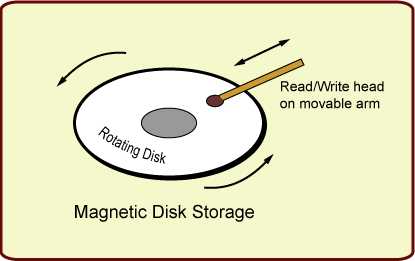Hard Disks

The hard disk of a computer system records bytes on a magnetic surface much like the surface of audio tape. The recording (writing) and reading of the data is done with a read/write head similar to that used with audio tape.
The picture shows one disk and one read/write head at the end of a movable arm. The arm moves in and out along a radius of the disk. Since the disk is rotating it will record data in a circular track on the disk. Later on, to read the data, it must be moved to the right position, then it must wait until the rotating disk brings the data into position. Just as with audio tape, data can be read without changing it. When new data it recorded, it replaces any data that was previously recorded at that location. Unlike audio tape, the read/write head does not actually touch the disk but skims just a little bit above it.
Usually the component called the "hard disk" of a computer system contains many individual disks and read/write heads like the above. The disks are coated with magnetic material on both sides (so each disk gets two read/write heads) and the disks are all attached to one spindel. All the disks and heads are sealed into a dust-free metal can. Since the operation of a hard disk involves mechanical motion (which is much slower than electronic processes), reading and writing data is much slower than with main memory.